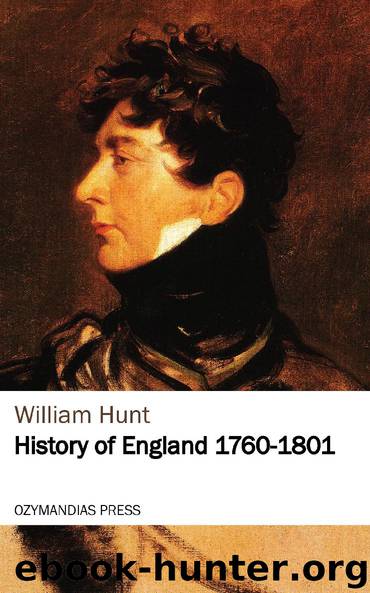History of England 1760 - 1801 by William Hunt

Author:William Hunt
Language: eng
Format: epub
Publisher: Pronoun
THE ROUT OF THE WHIGS.
THE NEW MINISTERS AT once attacked the sources from which the crown derived its corrupt influence over parliament. They carried bills preventing contractors from sitting in parliament and depriving revenue officers of the franchise. As these officers, who were dependent on the ministers of the crown, numbered according to one computation nearly 40,000, and to another 60,000, out of an electorate of about 300,000, their disfranchisement was an important step towards freedom of election. A message to parliament recommending economy was extorted from the king as an introduction to a plan of economical reform which was brought forward by Burke. It was not so drastic as his earlier plan, for the king acting in the cabinet through Shelburne and Thurlow objected to many of the proposed retrenchments. Nevertheless, in spite of mutilations, the bill, which became law, effected a saving of £72,000 a year, chiefly by abolishing useless offices. The act also again provided for the payment of arrears of the civil list, amounting this time to £296,000. Burke nobly continued his work by a bill for the reform of his own office, preventing the paymaster from gaining the enormous profits appropriated by nearly all his predecessors. Another declaration in favour of freedom of election was made by the commons, for they at last accepted Wilkes’s annual motion for expunging from their journals the resolution of February, 1769, declaring him incapable of re-election. The corrupt influence of the crown would, Pitt declared, be checked most effectually by a reform of parliament. Acting on his own account, he proposed an inquiry into the state of the representation, without bringing forward any scheme of reform. He pointed out that some boroughs were in the hands of the treasury, that others had no actual existence, and that many were merely the property of purchasers, the nawáb of Arcot, for example, returning seven or eight members. His motion, though supported by Fox, was rejected by 161 to 141.
Most memorable of the changes effected during the Rockingham administration is the establishment of the legislative independence of Ireland. When Carlisle went over as viceroy in December, 1780, he was instructed that the government would not oppose the demand for a habeas corpus act, but that he was to prevent parliament from declaring for legislative independence, or for a limitation of the perpetual mutiny act which kept the army beyond its control. The Irish parliament for a while steadily supported the government. The small party in opposition included Flood, who, after holding a lucrative office for six years, found himself unable to influence the government, adopted a hostile line, and was dismissed, and, above all, Grattan who had become leader of the party after Flood took office. But the force which was to enlist parliament on the national side was outside its walls. The volunteers grew in strength, and reviews of large bodies of them were held during the summer of 1781. They remained loyal, and when in September the fleets of France and Spain threatened the coast of Munster, they eagerly prepared to meet the enemy.
Download
This site does not store any files on its server. We only index and link to content provided by other sites. Please contact the content providers to delete copyright contents if any and email us, we'll remove relevant links or contents immediately.
Kathy Andrews Collection by Kathy Andrews(10544)
The remains of the day by Kazuo Ishiguro(7570)
Spare by Prince Harry The Duke of Sussex(4216)
Paper Towns by Green John(4175)
The Body: A Guide for Occupants by Bill Bryson(3813)
Be in a Treehouse by Pete Nelson(3230)
Harry Potter and the Goblet Of Fire by J.K. Rowling(3064)
Goodbye Paradise(2972)
Never by Ken Follett(2904)
Into Thin Air by Jon Krakauer(2711)
The Remains of the Day by Kazuo Ishiguro(2626)
The Genius of Japanese Carpentry by Azby Brown(2613)
The Cellar by Natasha Preston(2602)
Drawing Shortcuts: Developing Quick Drawing Skills Using Today's Technology by Leggitt Jim(2534)
120 Days of Sodom by Marquis de Sade(2444)
Architecture 101 by Nicole Bridge(2355)
Machine Learning at Scale with H2O by Gregory Keys | David Whiting(2308)
The Man Who Died Twice by Richard Osman(2304)
Industrial Automation from Scratch: A hands-on guide to using sensors, actuators, PLCs, HMIs, and SCADA to automate industrial processes by Olushola Akande(2108)
